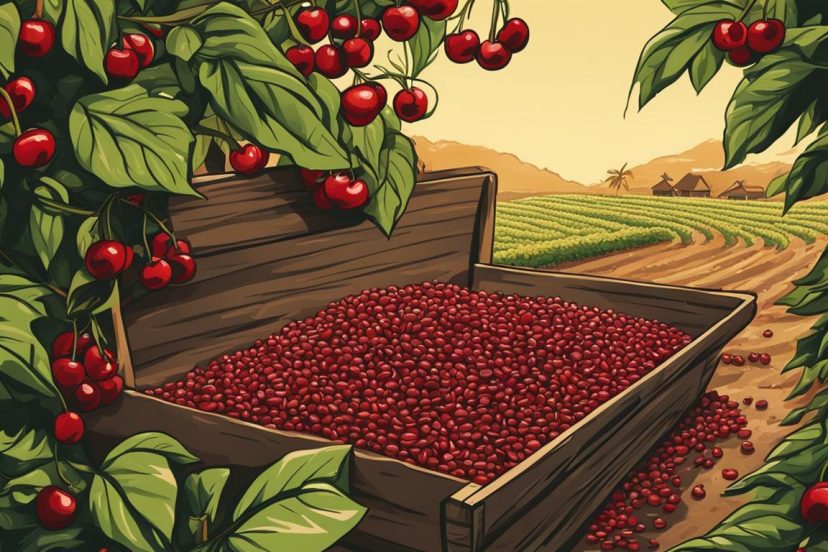How are coffee beans processed in natural fermentation?
In the world of coffee, there is a fascinating process that takes place after the initial processing – natural fermentation. This carefully controlled fermentation brings out new flavors and aromas in the coffee beans, resulting in a truly unique and delightful experience for coffee lovers.
Page Contents
Natural fermentation is a deliberate stage in coffee bean processing that enhances the taste and aroma of the final product. It is a key step that contributes to the complexity and depth of flavor found in high-quality coffee. By allowing the coffee beans to undergo fermentation, we unlock a whole new world of flavor possibilities.
During natural fermentation, the sugars and starches in the coffee beans are converted by yeast, bacteria, and other microorganisms. This process breaks down the components of the beans and develops new compounds that contribute to the flavor profile of the coffee. The result is a rich and multidimensional taste that sets fermented coffee apart from the rest.
Your Perfect Brew Awaits with Our Premium Coffee Beans
Indulge in the rich, aromatic experience of our carefully selected coffee beans, sourced from the finest estates. Each bean is roasted to perfection, ensuring a smooth, full-bodied flavor that will awaken your senses and elevate your coffee moments.
Discover the difference quality makes - try our premium coffee beans today and elevate your coffee experience to new heights!
Not only does natural fermentation add complexity to the flavor profile of the coffee, but it also offers health benefits. The fermentation process makes the coffee easier to digest, and it reduces the presence of tannins, which can cause tooth staining. So, not only do you get to enjoy a truly exceptional cup of coffee, but you’re also taking care of your digestive health.
Key Takeaways:
- Natural fermentation is a deliberate stage in coffee bean processing, enhancing flavor and aroma.
- During fermentation, sugars and starches in coffee beans are converted by microorganisms.
- Fermented coffee offers a unique and complex flavor profile.
- Natural fermentation makes coffee easier to digest and reduces tannin content.
- Exploring the world of natural fermentation in coffee brings a delightful and enriching coffee experience.
What is natural fermentation in coffee?
Natural fermentation is a crucial stage in the coffee processing journey that occurs after the initial processing. This deliberate and controlled process plays a significant role in bringing out new and exciting flavors in the coffee. Unlike fermentation as a mere part of the coffee processing dynamic, natural fermentation takes center stage, showcasing its own distinct qualities and contributions to the final product.
Natural fermentation in coffee involves carefully cultivating an environment where microorganisms can thrive and interact with the coffee beans. This intentional approach allows the microorganisms to break down certain compounds and develop new ones, ultimately adding complexity and depth to the flavor profile of the coffee.
During natural fermentation, the coffee beans undergo a transformative and dynamic process where their chemical composition evolves. This deliberate stage of fermentation allows for the creation of unique flavor profiles that cannot be achieved through traditional processing methods alone.
With natural fermentation, coffee producers have the opportunity to experiment with different approaches and techniques, enabling them to craft distinct flavor profiles and push the boundaries of what’s possible in the coffee industry.
Now that we understand the basics of natural fermentation in coffee, let’s explore how this process unfolds in the coffee industry and the various methods employed.
How does fermentation work in the coffee industry?
Fermentation is a natural chemical reaction that plays a crucial role in the coffee industry. It is a process where sugars and starches in coffee beans are converted into other compounds by yeast, bacteria, and microorganisms. This transformative process breaks down various components within the coffee beans and triggers the development of new compounds that contribute to the flavor and overall quality of the coffee.
Coffee fermentation typically occurs after the initial processing of coffee beans, such as harvesting, sorting, and washing. Once the beans have been pulped and the outer layer removed, they are left to ferment in a controlled environment. This environment allows microorganisms to metabolize the remaining sugars and starches, leading to chemical changes that create unique flavors and aromatic characteristics.
The duration of fermentation varies depending on factors like climate, coffee variety, and desired outcomes. It can range from a few hours to several days. During this time, the temperature, humidity, and oxygen levels must be carefully monitored to ensure optimal fermentation conditions.
Factors influencing flavor development during coffee fermentation
The flavor development during coffee fermentation is influenced by several factors:
- Microorganisms: The specific types of yeast, bacteria, and other microorganisms present during fermentation significantly impact the flavor profile of the coffee. Different strains of microorganisms produce distinct flavors, resulting in a wide range of taste possibilities.
- Fermentation time: The duration of fermentation affects the intensity and complexity of flavors. Shorter fermentation times may yield lighter and more subtle flavors, while longer fermentation times can result in bolder, more pronounced characteristics.
- Fermentation environment: Factors like temperature, humidity, and oxygen levels in the fermentation environment can influence the activity of microorganisms and the chemical reactions taking place. Each of these variables must be carefully controlled to achieve desired flavor outcomes.
- Coffee variety: Different coffee varieties possess distinct biochemical compositions, which interact differently with fermentation processes. These variations contribute to the diversity of flavors found in fermented coffees.
The art of fermentation in the coffee industry lies in balancing these variables to create unique and desirable flavor profiles. Roasters and coffee professionals carefully manage the fermentation process to achieve specific taste profiles, exploring the potential of different fermentation methods, time durations, and microorganism cultures.
The flavor development through fermentation is a fascinating aspect of the coffee industry, allowing for the creation of diverse and exquisite coffee experiences. By nurturing the natural chemical reactions and carefully manipulating the brewing parameters, coffee producers can bring out the best flavors in their beans, delighting coffee enthusiasts around the world.

Different methods of natural fermentation in coffee
When it comes to natural fermentation in coffee processing, there are various methods that can be employed to create unique flavors and characteristics. Let’s take a closer look at some of these methods:
Method 1: Soaking with bacteria and yeast
One common method involves soaking the coffee beans in water and adding specific strains of bacteria and yeast. This allows for a controlled fermentation process, where the microorganisms break down sugars and starches in the beans, leading to the development of new flavors and aromas. The beans are typically left to ferment for a specific period of time, and the length of fermentation can greatly impact the final flavor profile of the coffee.
Method 2: Barrel aging
Another unique method is barrel aging, where coffee beans are aged in whiskey or gin barrels. During the aging process, the beans absorb the flavors and nuances of the barrels, resulting in a distinct taste profile. This method adds a layer of complexity and richness to the coffee, as it combines the natural fermentation process with the unique characteristics of the barrels.
Method 3: Fruit fermentation
Fruit fermentation is a method that involves fermenting coffee beans together with fruits like grapes or oranges. The natural sugars present in the fruits interact with the coffee beans, creating a symbiotic fermentation process that enhances the flavor and aroma. This method yields a coffee with bright and fruity notes, adding a refreshing twist to the traditional coffee experience.
These are just a few examples of the different methods used for natural fermentation in coffee processing. Each method brings its own unique flavors and characteristics to the final product, allowing coffee enthusiasts to explore and enjoy a wide range of taste experiences.
Flavors and Characteristics of Fermented Coffee
Fermented coffee offers a unique flavor profile with complex layers of flavor and a natural sweetness. The specific flavors can vary depending on the type of bean and the brewing method used. Fermented coffee often has a distinct and deliciously different taste compared to regular coffee.
During the fermentation process, various chemical reactions occur that contribute to the development of flavors. The breakdown of sugars and starches by microorganisms leads to the formation of new compounds, which add complexity to the coffee’s flavor profile.
One of the key characteristics of fermented coffee is the presence of fruity and floral notes. These flavors are a result of the interaction between the coffee beans and the microorganisms involved in the fermentation process. Depending on the specific fermentation method used, coffee can exhibit flavors reminiscent of berries, stone fruits, citrus, or even tropical fruits.
In addition to the fruity and floral notes, fermented coffee often showcases a pleasant acidity. This acidity adds brightness and liveliness to the overall flavor profile. It can range from delicate and subtle to vibrant and pronounced, depending on the specific coffee bean and fermentation process.
The natural sweetness found in fermented coffee is another notable feature. The fermentation process creates sugars that enhance the coffee’s sweetness, resulting in a well-balanced and enjoyable taste. The sweetness of fermented coffee is often described as caramel-like or honey-like.
The complexity of fermented coffee sets it apart from other types of coffee. The combination of the fruity, floral flavors, the acidity, and the natural sweetness creates a multidimensional taste experience. Each sip reveals different layers of flavor, providing a sensory journey for coffee enthusiasts.
Examples of Flavors in Fermented Coffee:
- Strawberry
- Peach
- Blueberry
- Citrus
- Pineapple
- Dried fruits
- Caramel
Experimenting with different types of fermented coffee can open up a world of flavors and aromas. Whether you prefer a bright and fruity cup or a sweet and floral one, fermented coffee offers an array of options to suit your taste preferences.

Health benefits of fermented coffee
Fermented coffee not only delights our taste buds with its unique flavors, but it also offers several health benefits. Let’s explore how this special brew can contribute to our well-being.
Easier digestion
One of the notable health benefits of fermented coffee is its impact on digestion. The fermentation process breaks down complex compounds in coffee beans, resulting in a coffee that is easier to digest. This can be particularly beneficial for individuals with sensitive stomachs or those who experience discomfort after consuming regular coffee.
Reduced tannins
Another advantage of fermented coffee is its lower tannin content compared to traditional coffee. Tannins are natural compounds found in various beverages, including coffee, tea, and wine. While tannins contribute to the astringency and bitter taste of these drinks, they may also cause tooth staining. Fermented coffee, with its reduced tannin levels, offers a solution for coffee lovers who wish to minimize the potential for tooth discoloration.
Now, let’s take a closer look at the health benefits of fermented coffee in comparison to regular coffee:
| Health Benefits | Fermented Coffee | Regular Coffee |
|---|---|---|
| Easier digestion | ✓ | ✓ |
| Reduced tannins | ✓ | – |
| Antioxidants | Varies | Varies |
| Vitamins and minerals | Varies | Varies |
While fermented coffee has the edge when it comes to easier digestion and reduced tannin content, it’s important to note that the overall health benefits of coffee, such as antioxidants, vitamins, and minerals, can vary depending on factors such as the coffee bean variety and brewing method.
In conclusion, fermented coffee not only satisfies our taste buds but also offers health benefits such as improved digestion and reduced tannin levels. Whether you’re a coffee enthusiast or someone looking for a more gentle and teeth-friendly coffee experience, fermented coffee is definitely worth exploring.
Conclusion
After exploring the world of natural fermentation in coffee, we can see how this ancient method greatly impacts the flavor and aroma of coffee beans. Through a deliberate and controlled fermentation process, unique flavors are brought out, creating a truly distinctive coffee experience.
Not only does fermented coffee offer a delightful flavor profile with complex layers of taste and natural sweetness, but it also provides health benefits. The fermentation process makes the coffee easier to digest, making it a great option for those with sensitive stomachs. Additionally, fermented coffee contains fewer tannins, reducing the risk of tooth staining associated with traditional coffee consumption.
By embracing natural fermentation in coffee processing, we can savor the rich flavors and enjoy the numerous health benefits it offers. So, the next time you sip your favorite cup of coffee, take a moment to appreciate the journey it has undergone, from bean to brew, and the remarkable impact natural fermentation has had on enhancing its overall quality.
FAQ
How are coffee beans processed in natural fermentation?
Coffee beans go through a natural fermentation process after the initial processing. This carefully controlled fermentation brings out new flavors and enhances the taste and aroma of the coffee.
What is natural fermentation in coffee?
Natural fermentation in coffee is a deliberate and controlled stage that takes place after the initial processing. It is a process that brings out unique flavors in the coffee, making it stand out from regular coffee.
How does fermentation work in the coffee industry?
Fermentation in the coffee industry is a natural chemical reaction that involves the conversion of sugars and starches in coffee beans by microorganisms like yeast and bacteria. This process breaks down the components in the beans and develops new compounds that contribute to the flavor and quality of the coffee.
What are the different methods of natural fermentation in coffee?
There are various methods of natural fermentation in coffee processing. These include soaking the coffee beans in water with bacteria and yeast, barrel aging the beans in whiskey or gin barrels, and fruit fermentation, where coffee is fermented with fruits like grapes or oranges.
What flavors and characteristics can be found in fermented coffee?
Fermented coffee offers a unique flavor profile with complex layers of flavor and a natural sweetness. The specific flavors can vary depending on the type of bean and the brewing method used. Fermented coffee often has a distinct and deliciously different taste compared to regular coffee.
What are the health benefits of fermented coffee?
While fermented coffee doesn’t contain probiotics like other fermented foods, it does offer health benefits. The fermentation process makes it easier to digest, and it contains fewer tannins, which can promote tooth staining. Additionally, coffee itself has numerous health benefits, making fermented coffee a great choice for coffee lovers.
Why is natural fermentation important in coffee processing?
Natural fermentation is an ancient method used in coffee processing that enhances the flavor and aroma of coffee beans. It is a deliberate and controlled process that brings out unique flavors in the coffee. Along with its flavor benefits, fermented coffee also offers health benefits such as easier digestion and fewer tannins.




